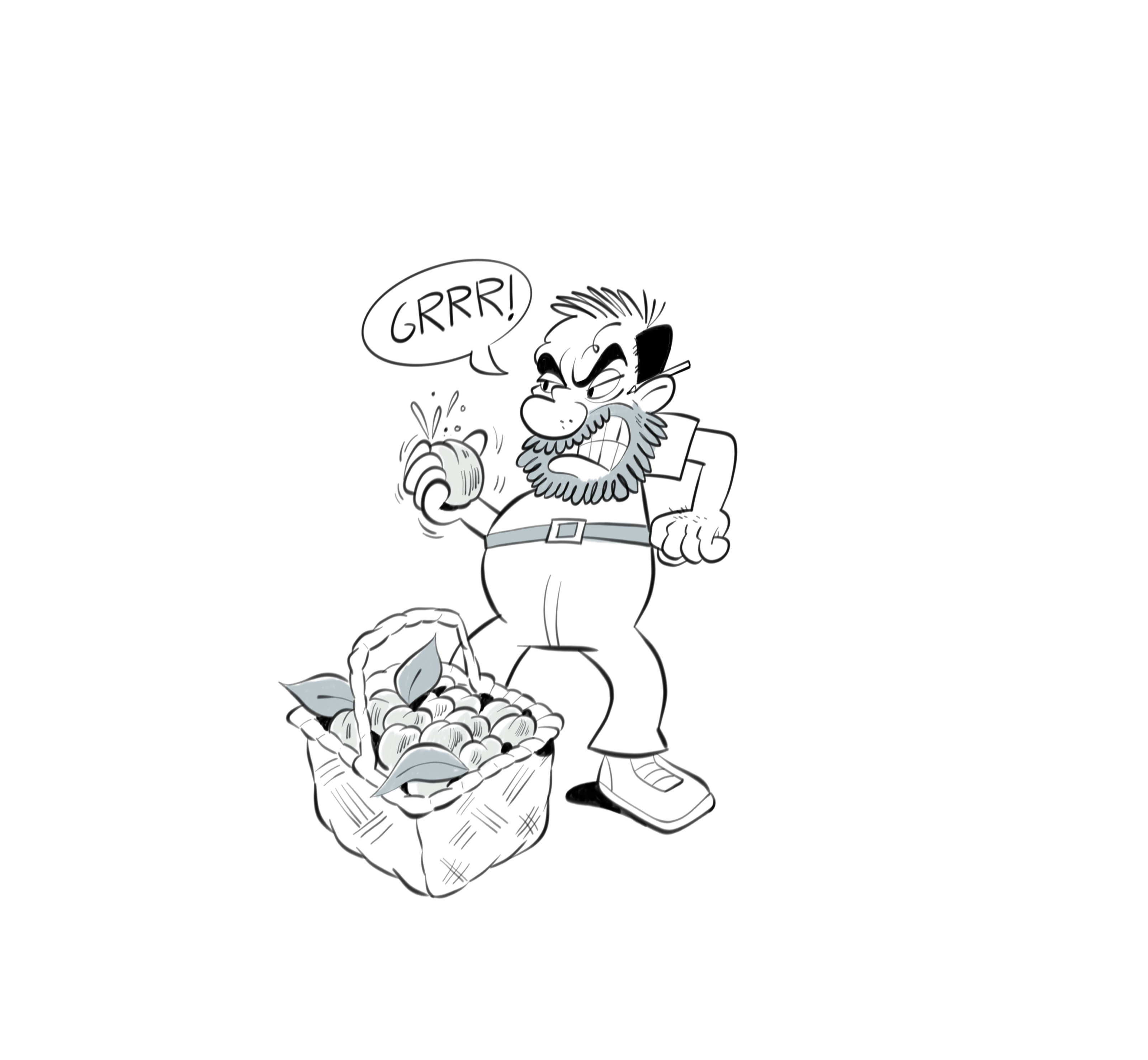brignon
[briˈɲuŋ]
1.a. prugna
1.b. susina
2. gelone
N + Adj/AdjP (or Adj + N)
| Genoese | Italian |
|---|---|
|
brignon cheutto
[briˈɲuŋ ˈkøtˑu] |
prugna cotta
|
|
brignon sarvægo
[briˈɲuŋ sarˈvɛːgu]
Inte sto bòsco gh’é pin de brignoin sarvæghi.
|
prugna selvatica
susina selvatica
In questo bosco ci sono un sacco di prugne selvatiche.
|
|
brignon secco
[briˈɲuŋ ˈsekˑu] |
prugna secca
|
N + Prep + N (brignon)
| Genoese | Italian |
|---|---|
|
òsso do brignon
[ˈɔsˑu du briˈɲuŋ]
Da figgeu se demoavimo co-i òsci da fruta, mascime con quelli de bricòcalo, de perseghe e de brignon.
|
nocciolo della prugna
nocciolo della susina
Da bambini ci divertivamo a giocare con gli ossi della frutta, soprattutto quelli delle albicocche, delle pesche e delle susine.
|
|
pelle do brignon
[ˈpelˑe du briˈɲuŋ] |
buccia della prugna
buccia della susina
|
V + N (DirObj or its predicative complement)
| Genoese | Italian |
|---|---|
|
lavâ un brignon
[laˈva ŋ briˈɲuŋ] |
lavare una prugna
lavare una susina
|
|
mondâ un brignon
[muŋˈda ŋ briˈɲuŋ] |
pulire una prugna
pulire una susina
(= ‘sbucciare una prugna o una susina ed eventualmente eliminarne le parti non commestibili, oltre al nocciolo’)
|
Further structures
| Genoese | Italian |
|---|---|
|
allevâ a pelle à un brignon, levâ a pelle à un brignon
[aleˈvaː a ˈpel(e) a ŋ briˈɲuŋ], [leˈvaː a ˈpel(e) a ŋ briˈɲuŋ]
Se ti deuvi un cotello pe allevâ a pelle a-o brignon ti t’avansi de bruttâte e moen, no t’ô pâ?
|
sbucciare una prugna
sbucciare una susina
Usando un coltello per sbucciare la prugna eviteresti di sporcarti le mani, non credi?
|
brignon as (part of a) DirObj (including subordinate clauses)
| Genoese | Italian |
|---|---|
|
avei o brignon [fam.]
[aˈvei̯ u briˈɲuŋ]
Ancheu o Gregöio l’é megio se ti ô lasci perde: se ghe vedde ciæo ch’o l’à o brignon.
|
avere la luna storta [fam.]
(= ‘essere di malumore’)
Oggi è meglio se Gregorio lo lasci perdere: si vede lontano un miglio che ha la luna storta.
|
|
piggiâ o brignon [fam.]
[piˈd͡ʒɔu̯ briˈɲuŋ] |
inalberarsi [fam.]
|

«Piggiâ o brignon».
[ZE] O scignificato do fraseologismo o l’é rappresentou piggiando i seu elementi de lescico e scintasci into scignificou ciù streito: a persoña piggiâ da-a raggia – inte sto caxo un besagnin – a l’é missa in figua tanto ch’o piggia inte moen un brignon d’inte un cavagno de fruta.
[IT] Il significato del fraseologismo (‘incollerisi’, ‘inalberarsi’) è rappresentato facendo perno su un’interpretazione meramente «letterale» delle sue componenti lessicali e sintattiche: la persona in preda alla collera – in questo caso un fruttivendolo – è raffigurata nell’atto di prendere in mano una prugna (in genovese “brignon”) da un cestino di frutta.
[EN] The meaning of the phraseme (‘to get angry’, ‘to be short-tempered’) is represented by a mere literal interpretation of its lexical and syntactic components: the person who is very angry – in this case a greengrocer – is represented in the act of taking a prune (“brignon” in Genoese) from a fruit basket.
[DE] Die Bedeutung dieses Phrasems (‚wütend werden‘, ‚aufbrausend sein‘) wird hier rein wörtlich und auf seinen lexikalischen und syntaktischen Komponenten basierend dargestellt: Die Person, die einen Wutausbruch hat – in diesem Fall ein Obsthändler – wird beim Herausnehmen einer Pflaume („brignon“ auf Genuesisch) aus einem Obstkorb dargestellt.
[ZE] O scignificato do fraseologismo o l’é rappresentou piggiando i seu elementi de lescico e scintasci into scignificou ciù streito: a persoña piggiâ da-a raggia – inte sto caxo un besagnin – a l’é missa in figua tanto ch’o piggia inte moen un brignon d’inte un cavagno de fruta.
[IT] Il significato del fraseologismo (‘incollerisi’, ‘inalberarsi’) è rappresentato facendo perno su un’interpretazione meramente «letterale» delle sue componenti lessicali e sintattiche: la persona in preda alla collera – in questo caso un fruttivendolo – è raffigurata nell’atto di prendere in mano una prugna (in genovese “brignon”) da un cestino di frutta.
[EN] The meaning of the phraseme (‘to get angry’, ‘to be short-tempered’) is represented by a mere literal interpretation of its lexical and syntactic components: the person who is very angry – in this case a greengrocer – is represented in the act of taking a prune (“brignon” in Genoese) from a fruit basket.
[DE] Die Bedeutung dieses Phrasems (‚wütend werden‘, ‚aufbrausend sein‘) wird hier rein wörtlich und auf seinen lexikalischen und syntaktischen Komponenten basierend dargestellt: Die Person, die einen Wutausbruch hat – in diesem Fall ein Obsthändler – wird beim Herausnehmen einer Pflaume („brignon“ auf Genuesisch) aus einem Obstkorb dargestellt.